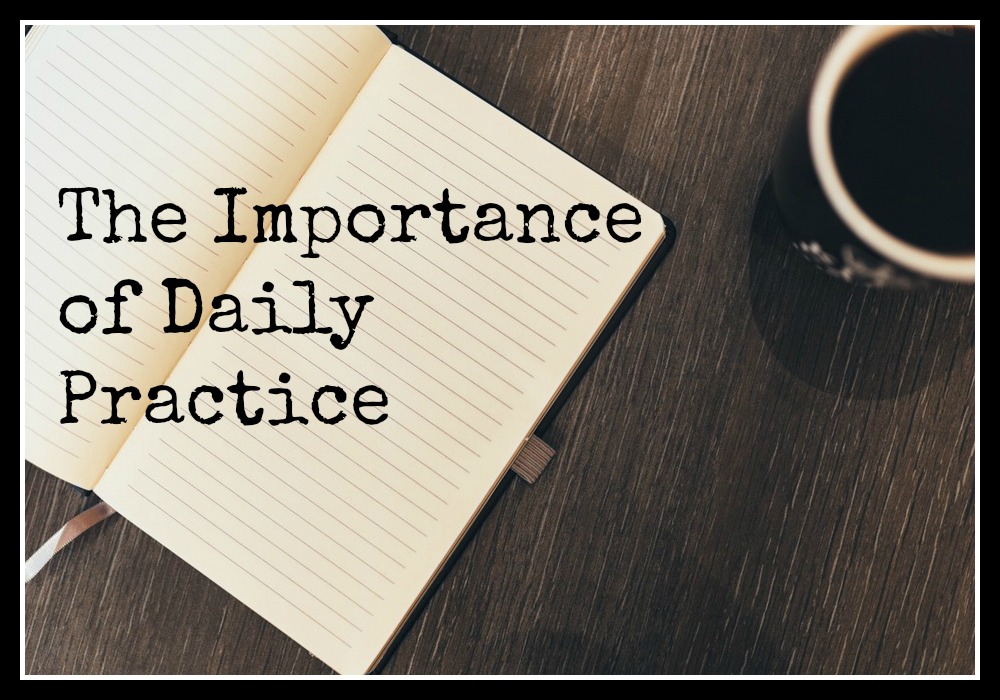Practice, noun: the repeated exercise in, or performance of, an activity or skill so as to acquire or maintain proficiency in it.
A foundational tenet of our program is that in order to change habits, a person must have “a practice.” We borrowed the idea of a practice from the Eastern traditions of yoga, meditation, and martial arts. It is process-oriented, meaning that the process is as important as the goal. And it implies a certain rigor, seriousness, and profound commitment to transformation. It is something that is woven into the everyday fabric of your life–that, while ordinary–produces significant changes to body, mind, and spirit. You never get it totally perfect—and that is fine—that’s why it’s called “practice.”
As many know, I practice a martial art called Aikido. There is a saying about training: “you need to touch the jo (wooden practice staff) daily.” This means that I need to make contact with my practice—in some way— every day. When I do that, my training is always at the forefront of my mind. Whatever decision I make becomes subtly influenced by my training principles. What I eat, how much rest I get, how much time I spend in front of a screen, even the quality of my thought patterns, are all influenced by the fact that I make contact with my practice on a daily basis. And even when I “mess up,” the degree to which I mess up is influenced by the fact that my training is never far from my mind. Believe me, when I am not making contact with my practice daily, the positive benefits decrease with each passing day, and the negative results increase (a vicious cycle vs. a virtuous cycle).
Living a Mindful Life, for the purpose of weight loss and health, is a practice. It is your practice, so you will find what works for you. You should have contact with your practice daily to increase the positive momentum of new habits, and decrease the negative momentum of troublesome habits. This doesn’t have to be time-consuming. As Steve likes to say, a consistent drop of water can bore a hole through rock. Think of your practice as the drop of water.
Here are 9 ways to have daily contact with a Mindful Life. Choose a combination, or come up with your own:
- Meditate–or pray– for 3 to 5 minutes every day. This is the bedrock upon which everything rests. Use the guided meditation that I made on Sound Cloud, or find another one of your choosing. You Tube has thousands. There are also free meditation apps for your phone (I have one called “Calm”). Set your intention first thing in the morning. Recharge throughout the day as necessary. For more details on how to have a regular mindfulness meditation practice, see my earlier post. We also have free guided meditation sessions at our location on Saturdays at 3pm.
- Exercise. Even on your busiest days, try to fit in activity or exercise. It will boost your mood, metabolism, fitness level, as well as influence your eating behavior. Many people have told me that they made better food choices throughout the day because they didn’t want to undo the hard work from their morning workout.
- Do the “Green for 15” challenge. Enjoying nature, even for brief periods, can reduce stress, increase positive feelings, and generally improve health. Connecting to nature helps us to connect to our bodies, and eat more mindfully.
- Mindful eating. We all have to eat several times a day. Each time you eat is an opportunity to make contact with your practice. Eat as many meals as you can mindfully, slowly, with intention, and gratitude. I posted a sample mindful eating exercise (for eating an apple) on Sound Cloud.
- Connect. Make contact with a like-minded person. Find someone who is trying to lose weight, workout, or eat well. Sometimes a simple text of “how are you doing?” or “did you get to the gym today?” is all we need to keep our practice at the forefront of our minds. It can be surprising– the small shifts that influence our behavior. Helping others is a good way to help ourselves.
- Review your Vision Statement. This is a complete statement of where you want to go, why you want to go there, and the small steps that will take you there. This helps to focus your mind on your intention.
- Food diary/logs. Research shows that the simple act of recording your food intake can help with weight loss. I love My Fitness Pal. It is free, and not only records your food, exercise, and weight, but gives you an idea of your nutrient and sugar intake as well. They also have an online community where you can connect with others. The old-fashioned way of writing down what you eat: that works too!
- Read. If you have a favorite book about health, spirituality, or self-improvement, dedicate a few minutes to read it (or listen to it). Or take advantage of this blog. Simply reading or re-reading an article can help put your practice at the forefront of your mind.
- Journal or blog. Journaling is not for everyone, but it works wonders for many people. I am a dedicated journal writer. It provides an emotional outlet, insight into behaviors, and creative expression and freedom that are hard to find anywhere else. Some also find blogging about their weight loss journey to be helpful. Check out some of the great weight loss blogs out there for ideas and inspiration. Just knowing that you are going to write or post is a powerful way to keep your practice at the forefront of your mind.
Just about everything in our work and food environment is geared toward unhealthy habits. Our crammed schedules, sedentary lifestyle, processed food, lack of sleep, social isolation, economic pressures…most of modern life makes mindful living difficult. When you establish your own, individualized practice–and you make contact with your practice daily–that is the first step in creating momentum toward weight loss and improved health.

